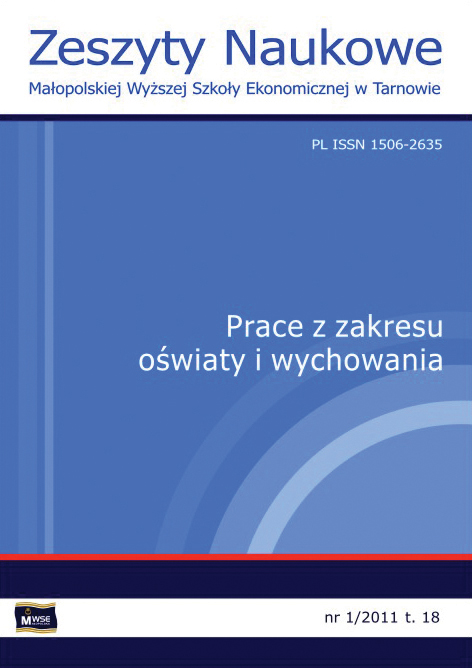Abstract
The subject of the research work is the issue of methods of spending free time by young people aged from 14 to 16 years, which come from different educational backgrounds. The aim of the research is to determine the role played by the educational environment in the process of preparing to a rational spending of free time by young people. The empirical material of this paper is data obtained as a result of research conducted in June 2009 at the Public Junior High School in Dąbrowa Tarnowska and in the Kids Shelter in Tarnów. Overall, 63 persons aged from 14 to 16 were researched, including 32 junior high school students and 31 children from the kids shelter. Whilst collecting the empirical material, the method of diagnostic poll was used, in which the research tool was a questionnaire on free time behaviour. On the basis of the analysis of the performed research it was found that the educational environment influences the place of spending free time and holiday and the frequency of mobile activities by the questioned children. The researched junior high school students spent their free time mostly at home or in sport facilities, and holidays in holiday resorts with their parents. The yard and house were the most common places of free time activity of the surveyed kids shelter children, who most often spent their holidays at home. However, the analysed educational institutions did not play a dominant role in preparing their pupils to use institutionalised forms of free time behaviour and failed to provide them with sufficient abilities with respect to their independent management of free time.
References
Alejziak B. 2008. Samowychowanie a turystyka. Kraków: Albis. ISBN 978-83-906452-2-3.
View in Google Scholar
Bombol M. 2005. Ekonomiczny wymiar czasu wolnego. Warszawa: SGH. ISSN 0867-7727.
View in Google Scholar
Bombol M. 2008. Czas wolny jako kategoria diagnostyczna procesów rozwoju społeczno-gospodarczego. Warszawa: SGH. ISSN 0867-7727.
View in Google Scholar
Bywalec C., Rudnicki L. 2002. Konsumpcja. Warszawa: PWE. ISBN 83-208-1390-5.
View in Google Scholar
Danecki J. 1970. Jedność podzielonego czasu. Warszawa: Książka i Wiedza.
View in Google Scholar
Dumazedier J. 1960. Current Problems of the Sociology of Leisure. „International Social Science Journal”, nr 2, s. 522–531.
View in Google Scholar
Jezierska B. 2002. Zajęcia sportowe w instytucjonalnym wychowaniu resocjalizacyjnym dzieci i młodzieży. „Human Movement”, nr 2, s. 23–29.
View in Google Scholar
Jung B. 1987. O czasie wolnym. Kultura i rekreacja w procesach rozwoju społeczno-ekonomicznego. Warszawa: SGPiS.
View in Google Scholar
Makówka M. 2006. Społeczno-ekonomiczne aspekty czasu wolnego. „Zeszyty Naukowe Akademii Ekonomicznej w Krakowie”, nr 716, s. 41–53.
View in Google Scholar
Martinek T., Hellison D. 1997. Fostering Resiliency in Underserved Youth Through Physical Activity. „Quest”, nr 49, s. 34–49.
View in Google Scholar
Przecławski K. 2002. Człowiek i jego czas wolny. „Human Movement”, nr 2, s. 38–41.
View in Google Scholar
Puciato D. 2009. Czas wolny jako determinanta jakości życia na przykładzie badań empirycznych. „Studia i Prace Kolegium Zarządzania i Finansów SGH”, nr 95, s. 97–109.
View in Google Scholar
Puciato D., Skałacka J. 2009. Rola turystyki w procesie wychowania młodzieży licealnej z Opola. „Rozprawy Naukowe AWF Wrocław”, nr 27, s. 97–103.
View in Google Scholar
Sas-Nowosielski K. 2001. Mity i fakty resocjalizacji poprzez kulturę fizyczną. „Wychowanie Fizyczne i Zdrowotne”, nr 11, s. 28–32.
View in Google Scholar
Wnuk-Lipiński E. 1972. Praca i wypoczynek w budżecie czasu. Warszawa: Zakład Narodowy im. Ossolińskich, Wydawnictwo PAN.
View in Google Scholar
© Copyright by Małopolska School of Economics in Tarnów. The articles are available under the Creative Commons Attribution NonCommercial-NoDerivatives 4.0 International License


